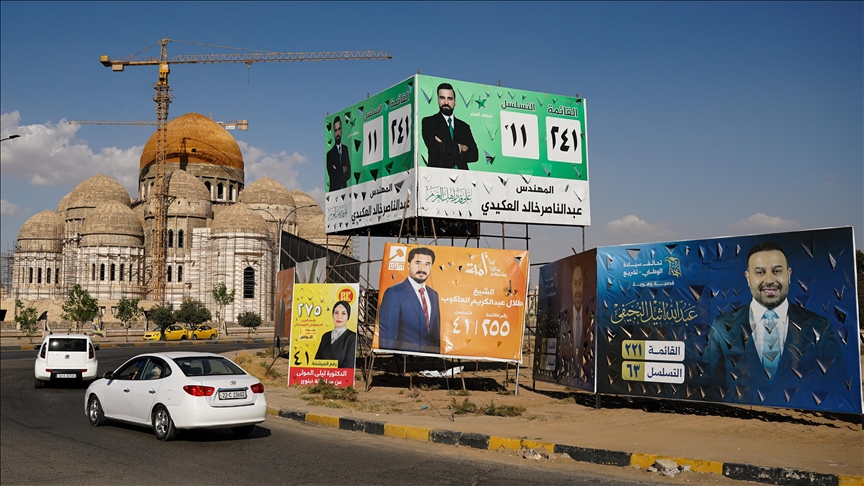INTERVIEW – Biometric cards, women’s quota mark Iraq’s preparations for Nov. 11 elections
Over 21 million Iraqis eligible to vote to elect members of parliament from among 7,754 candidates, including 2,250 women
 Election posters and campaign banners of candidates hang along main streets and roads ahead of the November 11 general elections in Mosul, Iraq, on October 27, 2025.
Election posters and campaign banners of candidates hang along main streets and roads ahead of the November 11 general elections in Mosul, Iraq, on October 27, 2025.
BAGHDAD / ISTANBUL
Iraq is preparing to hold parliamentary elections on Nov. 11, with 21 million people eligible to cast ballot, an Iraqi spokesperson said Tuesday.
Jumana al-Ghalai, spokesperson for Iraq’s Independent High Electoral Commission (IHEC), told Anadolu that 7,754 candidates will be competing in the elections, including 2,250 women, for 320 parliamentary seats, of which 83 are reserved for women.
The commission designated 8,703 polling stations to receive 21 million voters on Nov. 11, Ghalai said.
More than 1.8 million biometric cards have been distributed to voters so far in 1,079 registration centers in preparation for the polls, she added.
The parliamentary seats are distributed across 18 electoral districts, with each governorate serving as a separate district.
Seat distribution
The capital Baghdad leads with the highest number of seats at 69, including 17 reserved for women, according to commission data.
It is followed by the northeastern governorate of Ninawa with 31 seats, including 8 for women; Basra in the south has 25 seats, including 6 for women; and Dhi Qar with 19 seats, including 5 for women.
The central Babil governorate has 17 seats, including 4 for women, while Sulaymaniyah has 18 seats, with 5 reserved for women.
Anbar and Erbil have 15 seats each, 4 of which are for women, while Diyala has 14 seats, including 4 for women.
Kirkuk, Salahuddin, and Najaf each have 12 seats, with 3 reserved for women in each province.
Wasit, Al-Diwaniyah, Duhok, and Karbala have 11 seats, 3 of which are reserved for women.
Maysan has 10 seats, including 3 for women, and Muthanna has 7 seats, including 2 for the women’s quota.
Voting
Regarding voter eligibility, Ghalai said 21,404,291 Iraqis are eligible to vote in the parliamentary polls.
By province, Baghdad ranks first with 2,373,963 voters, followed by Ninawa with 2,102,420. Muthanna has the fewest, with 510,867 voters, according to commission data.
“The commission is currently distributing biometric cards, with more than 1.8 million cards issued through 1,079 registration centers,” she said.
The biometric card is a new voting mechanism designed to prevent fraud, as it contains all voter information, including a personal photo and fingerprints.
The cards will be confiscated immediately after the voting is completed to prevent reuse during the same election and returned to the voter after 72 hours.
“The commission will take over schools designated as polling stations on Nov. 5 and begin preparing them with all logistical materials related to the electoral process on Nov. 10,” Ghalai added.
She affirmed that the election commission is proceeding according to its operational schedule, “with only a few steps remaining to hold the elections on time.”
Under Iraqi law, elections must be held at least 45 days before the parliamentary term ends.
Shia parties and movements hold the majority in the current parliament, which began its term on Jan. 9, 2022, and will last four years, ending on Jan. 8, 2026.
The last legislative elections were held on Oct. 10, 2021, two years after popular protests forced former Prime Minister Adel Abdul-Mahdi to resign. Mustafa Abdul-Latif Al-Kadhimi succeeded him to oversee the 2021 elections.
The early elections marked a pivotal turning point in Iraq and were the fifth since the US occupation in 2003 and the first under a provincial electoral district system.
Iraq’s three branches of government are traditionally divided by sect: the presidency goes to Kurds, the prime ministership to Shias, and the parliamentary speaker to Sunnis, ensuring all segments of society are represented in government.
Anadolu Agency website contains only a portion of the news stories offered to subscribers in the AA News Broadcasting System (HAS), and in summarized form. Please contact us for subscription options.







